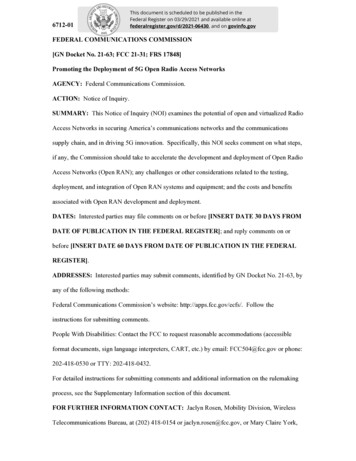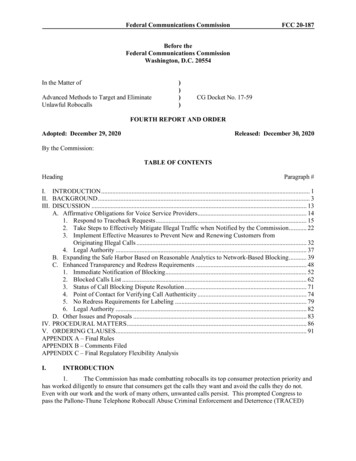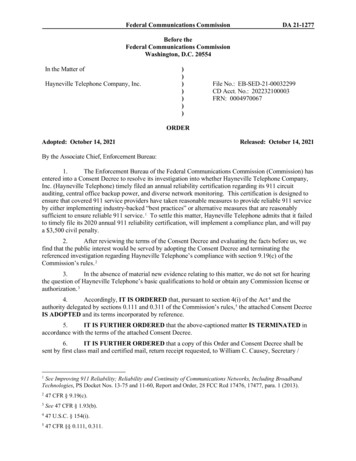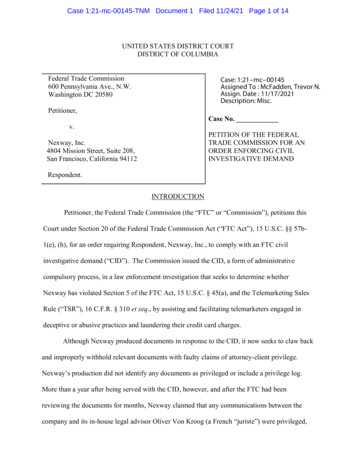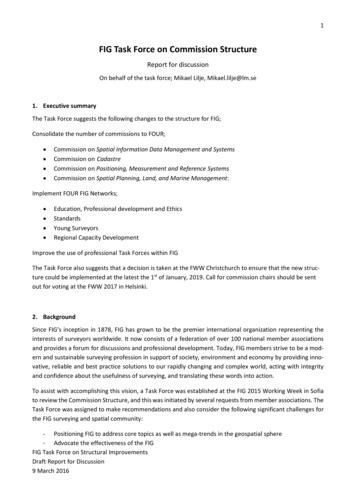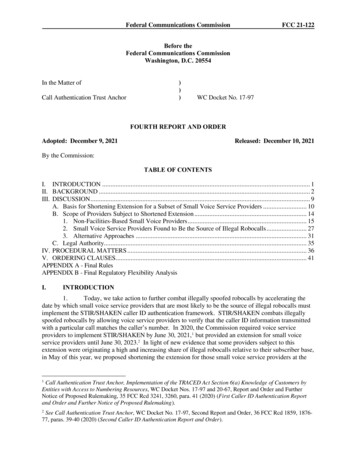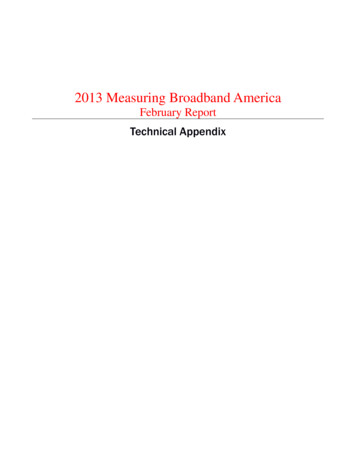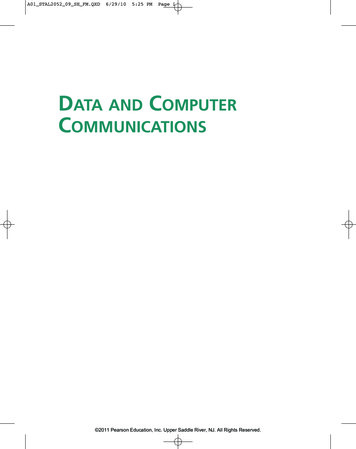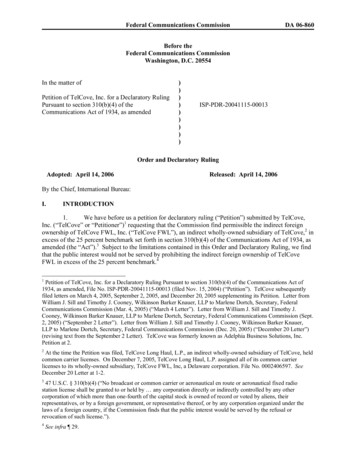
Transcription
Federal Communications CommissionDA 06-860Before theFederal Communications CommissionWashington, D.C. 20554In the matter ofPetition of TelCove, Inc. for a Declaratory RulingPursuant to section 310(b)(4) of theCommunications Act of 1934, as amended)))))))))ISP-PDR-20041115-00013Order and Declaratory RulingAdopted: April 14, 2006Released: April 14, 2006By the Chief, International Bureau:I.INTRODUCTION1.We have before us a petition for declaratory ruling (“Petition”) submitted by TelCove,Inc. (“TelCove” or “Petitioner”)1 requesting that the Commission find permissible the indirect foreignownership of TelCove FWL, Inc. (“TelCove FWL”), an indirect wholly-owned subsidiary of TelCove,2 inexcess of the 25 percent benchmark set forth in section 310(b)(4) of the Communications Act of 1934, asamended (the “Act”).3 Subject to the limitations contained in this Order and Declaratory Ruling, we findthat the public interest would not be served by prohibiting the indirect foreign ownership of TelCoveFWL in excess of the 25 percent benchmark.41Petition of TelCove, Inc. for a Declaratory Ruling Pursuant to section 310(b)(4) of the Communications Act of1934, as amended, File No. ISP-PDR-20041115-00013 (filed Nov. 15, 2004) (“Petition”). TelCove subsequentlyfiled letters on March 4, 2005, September 2, 2005, and December 20, 2005 supplementing its Petition. Letter fromWilliam J. Sill and Timothy J. Cooney, Wilkinson Barker Knauer, LLP to Marlene Dortch, Secretary, FederalCommunications Commission (Mar. 4, 2005) (“March 4 Letter”). Letter from William J. Sill and Timothy J.Cooney, Wilkinson Barker Knauer, LLP to Marlene Dortch, Secretary, Federal Communications Commission (Sept.2, 2005) (“September 2 Letter”). Letter from William J. Sill and Timothy J. Cooney, Wilkinson Barker Knauer,LLP to Marlene Dortch, Secretary, Federal Communications Commission (Dec. 20, 2005) (“December 20 Letter”)(revising text from the September 2 Letter). TelCove was formerly known as Adelphia Business Solutions, Inc.Petition at 2.2At the time the Petition was filed, TelCove Long Haul, L.P., an indirect wholly-owned subsidiary of TelCove, heldcommon carrier licenses. On December 7, 2005, TelCove Long Haul, L.P. assigned all of its common carrierlicenses to its wholly-owned subsidiary, TelCove FWL, Inc, a Delaware corporation. File No. 0002406597. SeeDecember 20 Letter at 1-2.347 U.S.C. § 310(b)(4) (“No broadcast or common carrier or aeronautical en route or aeronautical fixed radiostation license shall be granted to or held by any corporation directly or indirectly controlled by any othercorporation of which more than one-fourth of the capital stock is owned of record or voted by aliens, theirrepresentatives, or by a foreign government, or representative thereof, or by any corporation organized under thelaws of a foreign country, if the Commission finds that the public interest would be served by the refusal orrevocation of such license.”).4See infra ¶ 29.
Federal Communications CommissionII.DA 06-860BACKGROUND2.TelCove, a Delaware corporation, is a facilities-based CLEC that offers local and longdistance voice, dedicated data, ATM, frame relay, and Internet services via fiber optic facilities inapproximately 50 markets in the eastern part of the United States.5 Its indirect wholly-owned subsidiary,6TelCove FWL, a Delaware corporation, holds FCC licenses for facilities that are authorized, but not yetoperating, in the Local Multipoint Distribution Service and the 39 GHz bands.7 These licenses areclassified as common carrier licenses.83.TelCove filed a Petition seeking approval to exceed the 25 percent foreign ownershipbenchmark for common carrier licenses set forth in section 310(b)(4) of the Act.9 According to thePetition, TelCove and certain of its subsidiaries filed separate petitions for protection under Chapter 11 ofthe Bankruptcy Code in the U.S. Bankruptcy Court for the Southern District of New York in March andJune of 2002. Upon emergence from bankruptcy in 2004, TelCove became a privately-held companywhose shareholders include former bondholders and creditors, as well as their successors-in-interest.10Post bankruptcy, five investment vehicles controlled by Bay Harbour Management, L.C., a U.S. basedinvestment advisory firm, hold an aggregate 47.45 percent equity and voting interest in TelCove.11 Twoof these, Bay Harbour Partners Ltd. (20.37%) and Institutional Benchmark Master Fund (1.13%) areorganized overseas in the Cayman Islands and Bermuda, respectively.12 According to the Petition, otherforeign shareholders (including shareholders of unknown nationality) hold an additional aggregate 41.74percent of the equity and voting interests in TelCove.13 Thus, according to the Petition, the total foreigninvestment in TelCove is 63.24 percent. The Petitioner asserts, however, that of the 63.24 percent foreignequity and voting interests in TelCove, 54 percent are held by entities from WTO Member countries andthe remaining 9.24 percent are held by shareholders of unknown nationality.14 Accordingly, TelCoverequests a declaratory ruling, nunc pro tunc, that the public interest would not be served by prohibitingTelCove FWL’s 54 percent indirect foreign ownership by entities from WTO Member countries and 9.24percent indirect ownership by unidentified foreign investors.15 TelCove also requests that the5Petition at 2.6TelCove FWL is 100% owned by TelCove Long Haul, L.P., a U.S. limited partnership. TelCove Long Haul, L.P.is held as follows: (1) TelCove Operations Inc., a Delaware corporation (1% general partnership interest) and (2)TelCove, LLC, a Delaware limited liability company that is a wholly-owned subsidiary of TelCove Operations Inc.,(99% limited partnership interest). TelCove Operations Inc., in turn, is wholly owned by TelCove. December 20Letter 1-2; see Petition at 2-3.7December 20 Letter at 2; see File No. 0002406597.8Petition at 5 (noting that TelCove holds 193 LMDS and 177 39 GHz licenses).9On March 4, 2005, September 2, 2005, and December 20, 2005, TelCove submitted letters supplementinginformation previously provided on November 15, 2004. See March 4 Letter; September 2 Letter; December 20Letter.10Petition at 3.11September 2 Letter at Attachments A & H. TelCove is controlled by its seven-member board of directors, fourmembers of whom are owners of, or are employed by, Bay Harbour Management, L.C. TelCove’s directors are allU.S. citizens. September 2 Letter at 2 & Appendix A (Diagram of Ownership and Control of TelCove, Inc.);December 20 Letter.12September 2 Letter at Attachments A & H; December 20 Letter at Revised Attachments A & H.13Id.14Id.15September 2 Letter at 6; December 20 Letter at 7. We address the merits of TelCove’s request for nunc pro tunctreatment in paragraph 30 of this order.2
Federal Communications CommissionDA 06-860Commission grant authorization for an additional 25 percent foreign ownership as long as (1) no morethan 25 percent of its total ownership is attributable to entities from non-WTO countries and/or (2) nomore than 25 percent is attributable to a single previously unidentified entity from a WTO Membercountry.164.On January 19, 2005, the Commission released a public notice that found the Petitionacceptable for filing and requested comment on the Petition.17 No comments were filed in response to thepublic notice.5.On February 16, 2005, the United States Department of Homeland Security (“DHS”)requested, on behalf of itself, the United States Department of Justice (“DOJ”), the Federal Bureau ofInvestigation (“FBI”), and TelCove, that the Commission defer acting on TelCove’s Petition until theresolution of potential national security, law enforcement, and public safety issues.186.On June 15, 2005, TelCove entered into an agreement with DHS and DOJ (includingFBI) that was intended to ensure that DHS, DOJ and FBI and other entities with responsibilities forenforcing the law, protecting the national security, and preserving public safety can proceed in a legal,secure, and confidential manner to satisfy these responsibilities. This agreement was adopted as acondition to the Commission’s grant of an unrelated application by TelCove and covers all domesticcommunications infrastructure of TelCove, including the licenses subject to the Petition.197.On September 15, 2005, the Petitioner submitted a Joint Petition to Adopt Conditions toAuthorizations and Licenses Executed by DHS, DOJ, FBI and TelCove.20 The Joint Petition advised thatDHS, DOJ, and FBI have no objection to the Commission granting TelCove’s Petition, provided that theCommission conditions its grant on TelCove’s compliance with the terms of the June 15, 2005Agreement between and among DHS, DOJ, FBI, and TelCove.21III.DISCUSSION8.We consider the indirect foreign ownership of TelCove FWL pursuant to our publicinterest analysis under section 310(b)(4) of the Act and the Commission’s foreign ownership policiesadopted in the Foreign Participation Order.22 As part of that analysis, we consider any national security,16September 2 Letter at 7; December 20 Letter at 7.17Non Streamlined International Applications Accepted for Filing, Public Notice, Rep. No. TEL-00872NS (rel. Jan.19, 2005).18Department of Homeland Security, Department of Justice and the Federal Bureau of Investigation, and TelCove,Inc., Joint Petition to Defer, File No. ISP-PDR-20041115-00013 (filed Feb. 16, 2005).19Authorizations Granted Applications Filed for Acquisition of Assets of KMC Operating Companies by TelCove,Inc., Public Notice, WC Docket No. 05-90, 20 FCC Rcd 11125 (2005).20Department of Homeland Security, Department of Justice and the Federal Bureau of Investigation, and TelCove,Inc., Joint Petition to Adopt Conditions to Authorizations and Licenses, File No. ISP-PDR-20041115-00013 (filedSept. 15, 2005) & Agreement.21Id.; see also September 15 Letter at Attachment A (Joint Petition to Adopt Conditions to Authorizations andLicenses Executed by DHS, DOJ, FBI and TelCove).2247 U.S.C. § 310(b)(4); see Rules and Policies on Foreign Participation in the U.S. Telecommunications Market,Report and Order and Order on Reconsideration, FCC 97-398, 12 FCC Rcd 23891 (1997) (“Foreign ParticipationOrder”), Order on Reconsideration, FCC 00-339, 15 FCC Rcd 18158 (2000).3
Federal Communications CommissionDA 06-860law enforcement, foreign policy, or trade policy concerns raised by the indirect foreign investment.239.Section 310(b)(4) of the Act establishes a 25 percent benchmark for investment byforeign individuals, corporations, and governments in entities that control U.S. common carrier radiolicensees. This section also grants the Commission discretion to allow higher levels of foreign ownershipif it determines that such ownership is not inconsistent with the public interest.2410.The calculation of foreign ownership interests under section 310(b)(4) is a two-prongedanalysis in which the Commission examines separately the equity interests and the voting interests in thelicensee’s parent.25 The Commission calculates the equity interest of each foreign investor in the parentand then aggregates these interests to determine whether the sum of the foreign equity interests exceedsthe statutory benchmark. Similarly, the Commission calculates the voting interest of each foreigninvestor in the parent and aggregates these voting interests.26 The presence of aggregated alien equity orvoting interests in a common carrier licensee’s parent in excess of 25 percent triggers the applicability ofsection 310(b)(4)’s statutory benchmark.27 Once the benchmark is triggered, section 310(b)(4) directs theCommission to determine whether the “public interest will be served by the refusal or revocation of suchlicense.”28 In the Foreign Participation Order, the Commission concluded that the public interest wouldbe served by permitting greater investment by individuals or entities from WTO Member countries inU.S. common carrier and aeronautical fixed and en route radio licensees.29 Therefore, with respect toindirect foreign investment from WTO Members, the Commission replaced its “effective competitiveopportunities,” or “ECO,” test with a rebuttable presumption that such investment generally raises nocompetitive concerns.30 In evaluating an applicant’s request for approval of foreign ownership interestsunder section 310(b)(4), the Commission uses a “principal place of business” test to determine thenationality or “home market” of foreign investors.3123The Commission considers national security, law enforcement, foreign policy, and trade policy concerns whenanalyzing a petition for declaratory ruling pursuant to section 310(b)(4). Foreign Participation Order, 12 FCC Rcdat 23918-21, ¶¶ 59-66.2447 U.S.C. § 310(b)(4).25See BBC License Subsidiary L.P., Memorandum Opinion and Order, DA 95-364, 10 FCC Rcd 10968, 10973, ¶ 22(1995) (“BBC License Subsidiary”).26See id. at 10972, ¶ 20, & 10973-74, ¶¶ 22-25.27See id. at 10973-74, ¶ 25.28Sprint Corporation Petition for Declaratory Ruling Concerning Section 310(b)(4) and (d) and the Public InterestRequirements of the Communications Act of 1934, as amended, Declaratory Ruling and Order, FCC 95-498, 11 FCCRcd 1850, 1857-58, ¶ 47 (quoting section 310(b)(4)). It is the licensee’s obligation to inform the Commissionbefore its indirect foreign ownership exceeds the 25% benchmark set forth in section 310(b)(4). See Application ofFox Television Stations, Inc. for Renewal of License of Station WNYW-TV, New York, New York, MemorandumOpinion and Order, FCC 95-188, 10 FCC Rcd 8452, 8474-75, ¶ 52 (1995) (“Fox Television Stations, Inc.”).29Foreign Participation Order, 12 FCC Rcd at 23896, ¶ 9, 23913, ¶ 50, & 23940, ¶¶ 111-12.30Id31To determine a foreign entity’s home market for purposes of the public interest determination under section310(b)(4), the Commission will identify and balance the following factors: (1) the country of a foreign entity’sincorporation, organization or charter, (2) the nationality of all investment principals, officers, and directors, (3) thecountry in which the world headquarters is located, (4) the country in which the majority of the tangible property,including production, transmission, billing, information, and control facilities, is located, and (5) the country fromwhich the foreign entity derives the greatest sales and revenues from its operations. Foreign Participation Order, 12FCC Rcd at 23941, ¶ 116 (citing Market Entry and Regulation of Foreign-Affiliated Entities, Report and Order, FCC95-475, 11 FCC Rcd 3873, 3951, ¶ 207 (1995)). For examples of cases applying the five-factor “principal place of(continued.)4
Federal Communications CommissionDA 06-86011.In light of the policies adopted in the Foreign Participation Order, we begin ourevaluation of TelCove FWL’s indirect foreign ownership under section 310(b)(4) by calculating theforeign equity and voting interests in TelCove, the indirect U.S. parent of TelCove FWL, the commoncarrier licensee. We then determine whether these foreign interests properly are ascribed to individuals orentities that are citizens of, or have their principal places of business in, WTO Member countries. TheCommission stated, in the Foreign Participation Order, that it will deny an application if it finds thatmore than 25 percent of the ownership of an entity that controls a common carrier radio licensee isattributable to parties whose principal place(s) of business are in non-WTO Member countries that do notoffer effective competitive opportunities to U.S. investors in the particular service sector in which theapplicant seeks to compete in the U.S. market, unless other public interest considerations outweigh thatfinding.3212.In Wilner & Scheiner and its progeny, the Commission has set forth a standard forcalculating both alien equity and voting interests held in a licensee or in the licensees’ parents where suchinterests are held through intervening entities.33 In calculating attributable alien equity interests in aparent company, the Commission uses a multiplier to dilute the percentage of each investor’s equityinterest in the parent company when those interests are held through intervening companies. Themultiplier is applied to each link in the vertical ownership chain, regardless of whether any particular linkin the chain represents a controlling interest in the company positioned in the next lower tier.34 Once thepro rata equity interests of each alien investor are calculated, these interests then are aggregated todetermine whether the sum of the interests exceeds the statutory benchmark.3513.By contrast, in calculating alien voting interests in a parent company, the multiplier is notapplied to any link in the vertical ownership chain that constitutes a controlling interest in the companypositioned in the next lower tier.36 In circumstances where voting interests in the U.S. parent of acommon carrier licensee are held through intervening partnerships, the multiplier is not applied to dilute ageneral partnership interest or uninsulated limited partnership interest held by a foreign individual orentity. A general partner is considered to hold the same voting interest as the partnership holds in thecompany situated in the next lower tier of the vertical ownership chain. Similarly, in the absence of aspecific demonstration that a limited partner effectively is insulated from active involvement inpartnership affairs, a limited partner will be deemed to hold the same voting interest as the partnership(.continued from previous page)business” test, see Lockheed Martin Global Telecommunications, Comsat Corporation, and Comsat GeneralCorporation, Assignor, and Telenor Satellite Mobile Services, Inc., and Telenor Satellite, Inc., Assignee,Applications for Assignment of Section 214 Authorizations, Private Land Mobile Radio Licenses, ExperimentalLicenses, and Earth Station Licenses and Petition for Declaratory Ruling Pursuant to Section 310(b)(4) of theCommunications Act, Order and Authorization, FCC 01-369, 16 FCC Rcd 22897 (2001), erratum, DA 02-266, 17FCC Rcd 2147 (Int’l Bur. 2002), recon. denied, FCC 02-207, 17 FCC Rcd 14030 (2002); Space Station SystemLicensee, Inc., Assignor, and Iridium Constellation LLC, Assignee, et al., Memorandum Opinion, Order andAuthorization, DA 02-307, 17 FCC Rcd 2271 (Int’l Bur. 2002).32See Foreign Participation Order, 12 FCC Rcd at 23946, ¶ 131.33See generally Request for Declaratory Ruling Concerning the Citizenship Requirements of Sections 310(b)(3) and(4) of the Communications Act of 1934, as amended, Declaratory Ruling, FCC 85-295, 103 F.C.C. 2d 511 (1985)(“Wilner & Scheiner I”), recon. in part, FCC 86-406, 1 FCC Rcd 12 (1986); BBC License Subsidiary, 10 FCC Rcdat 10973-74, ¶¶ 22-25.34See BBC License Subsidiary, 10 FCC Rcd at 10973-74, ¶¶ 24-25.35See id. at 10973-74, ¶ 25.36See id. at 10973, ¶ 23; see also Wilner & Scheiner I, 103 F.C.C. 2d at 522, ¶ 19.5
Federal Communications CommissionDA 06-860holds in the company in the next lower tier of the vertical ownership chain.37 Thus, when evaluatingforeign voting interests in the U.S. parent company of a common carrier licensee, it is possible thatmultiple investors will be treated as holding the same voting interest in a U.S. parent company where theinvestment is held through multiple intervening holding companies or partnerships. Our purpose inidentifying the citizenship of the specific individuals or entities that hold these interests is not to increasethe aggregate level of foreign investment, but rather to determine whether any particular interest that aforeign investor proposes to acquire raises potential risks to competition or other public interest concerns,such as national security or law enforcement concerns.3814.For the reasons set forth below, we find that it would not serve the public interest toprohibit the indirect foreign ownership of TelCove FWL under section 310(b)(4) of the Act, and we grantTelCove’s Petition.39 We find that the majority of the foreign equity and voting interests identified in therecord that are held indirectly in TelCove FWL are properly ascribed to individuals and entities fromWTO Member countries, including the United States. Accordingly, the Petitioner is entitled to arebuttable presumption that the indirect foreign ownership of TelCove FWL would not pose a risk tocompetition in the U.S. market, and there is no evidence to rebut this presumption. Further, under theCommission’s precedent, we accord the appropriate level of deference to the Executive Branch’sexpertise on national security and law enforcement issues, and the Joint Petition to Adopt Conditions toAuthorizations and Licenses is granted. Pursuant to section 310(b)(4) of the Act and the Commission’sprecedent for indirect investment by WTO Members in U.S. common carrier radio licensees, we thereforeconclude that it would not serve the public interest to prohibit the indirect foreign ownership of TelCoveFWL.A.Attribution of Foreign Ownership Interests15.The Petitioner sent a detailed, eight-page “home market” questionnaire to the parentorganizations of each of its shareholders that hold more than one percent interest in TelCove. ThePetitioner obtained detailed home market and underlying investor information for institutional investorsthat are controlled by Bay Harbour Management, L.C. (“Bay Harbour”), which in turn controls TelCove’sboard of directors.40 TelCove, however, did not obtain home market information from certain minority37See, e.g., XO Communications, Inc., Applications for Consent to Transfer Control of Licenses and AuthorizationsPursuant to Sections 214 and 310(d) and Petition for Declaratory Ruling Pursuant to Section 310(b)(4) of theCommunications Act, IB Docket No. 02-50, Memorandum Opinion, Order and Authorization, DA 02-2512, 17 FCCRcd 19212, 19222, ¶ 24 (Int’l Bur., Wireless Tel. Bur. & Wireline Comp. Bur. 2002) (“XO Communications”).38See Foreign Participation Order, 12 FCC Rcd at 23940-41, ¶¶ 111-15.39The indirect foreign ownership of TelCove FWL does not raise any issues under section 310(a) and 310(b)(1)(b)(3) of the Act. Section 310(a) of the Act prohibits any radio license from being “granted to or held by” a foreigngovernment or its representative. 47 U.S.C. § 310(a). In this case, no foreign government or its representative holdsany of the radio licenses. Section 310(b)(1)-(2) of the Act prohibits common carrier, broadcast and aeronauticalfixed or en route radio licenses from being “granted to or held by” aliens, or their representatives, or foreigncorporations. 47 U.S.C. § 310(b)(1), (b)(2). According to the Petition, no alien, representative, or foreigncorporation holds any of the common carrier licenses. Accordingly, TelCove FWL’s indirect foreign ownership isnot inconsistent with the foreign ownership provisions of section 310(a) or 310(b)(1)-(b)(2) of the Act. SeeVoiceStream/Deutsche Telekom Order, 16 FCC Rcd at 9804-9809, ¶¶ 38-48. Additionally, because the foreigninvestment in TelCove FWL is held through TelCove Long Haul, L.P., TelCove Operations, Inc., and TelCove, thedirect and indirect U.S.-organized parent companies that control TelCove FWL, it does not trigger section 310(b)(3)of the Act, which places a 20% limit on alien, foreign corporate or foreign government ownership of entities thatthemselves hold common carrier, broadcast and aeronautical fixed or en route Title III licenses. Compare 47 U.S.C.§ 310(b)(3) with § 310(b)(4). See Wilner & Scheiner I, 103 F.C.C. 2d 511.40December 20 Letter at 4-7.6
Federal Communications CommissionDA 06-860shareholders.41 We calculate below the foreign equity and voting interests held in TelCove, the indirectU.S. parent of TelCove FWL, by and through the various investment vehicles that directly hold shares inTelCove based on the information in the record. We first calculate the foreign equity and voting interestsheld by and through the investment vehicles controlled by Bay Harbour. Next, we calculate the foreignequity and voting interests held by and through TelCove’s minority shareholders. Based on our review ofthe record, we find that the majority of the foreign equity and voting interests in TelCove constituteinvestment from the United States or another WTO Member country and that 9.24 percent areunidentified ownership interests, which we treat as investments from non-WTO Member countries.4216.Foreign Equity and Voting Interests Held By and Through Investment VehiclesControlled by Bay Harbour Management, LC. According to the Petitioner, the following fiveinvestment vehicles, which are managed and controlled by Bay Harbour,43 collectively holdapproximately 47 percent equity and voting interests in TelCove: (1) Bay Harbour Partners, Ltd. (“BHP”)(20.37%), (2) Institutional Benchmark Master Fund, Ltd. (“IBMF”) (1.13%), (3) Bay Harbour 90-1 Ltd.(17.39%) (“BH 90-1”), (4) Trophy Hunter Investments Ltd. (6.34%) (“Trophy”), and (5) d Quant Fund,LLC (2.22%) (“Quant”). Bay Harbour, in turn, is owned by: (1) John Stout, a U.S. citizen (5%),44 (2)Tower Investment Group, Inc., a U.S. company (“Tower”) (85%), and (3) Unity N.V., a NetherlandsAntilles limited liability company (“Unity”) (10%). Tower is owned by two U.S. citizens, each of whomholds 50 percent ownership interest in Tower.45 Unity is wholly-owned by the John TempletonFoundation, a Tennessee non-profit foundation.4617.As an initial matter, we find that the principal place of business or “home market” of BayHarbour, BH 90-1, Trophy, Quant, Tower, and Unity is the United States. According to the Petition, BayHarbour, BH 90-1, Trophy, Quant, and Tower are legally organized in the United States.47 Moreover,their investment principals, officers, and directors are U.S. citizens, and they have their worldheadquarters and derive the greatest sales and revenues from operations in the United States.Additionally, 100 percent of the investors in BH 90-1 and Trophy are U.S. citizens or entities, and, asnoted above, two U.S. citizens own and control Tower. Although only 46 percent of Quant is held in theaggregate by U.S. citizens, and the remaining 54 percent is held by a single “feeder fund” incorporated inthe Bahamas, the Petitioner asserts that the feeder fund is affiliated with and controlled by the same U.S.individual who manages Quant.48 As for Unity, although it is organized in the Netherlands Antilles, it iswholly-owned by the John Templeton Foundation, a Tennessee non-profit foundation, and three of itsfour managing directors are U.S. citizens.49 Moreover, the majority of Unity’s financial holdings,41September 2 Letter at 1.42We recommend the use of the ownership chart in Appendix A to this order, and the list of TelCove shareholdersreferenced in the ownership chart, which is included as Appendix B to this order, as a roadmap for the calculationsand analyses of the foreign ownership interests held in TelCove by and through its shareholders.43Petition at 3. According to the Petition, Bay Harbour itself does not own any equity interest in TelCove directly orindirectly. September 2 Letter at 2.44Mr. Stout is also a member of TelCove’s board of directors. September 2 Letter at 2; December 20 Letter atRevised Appendix A.45Each of Tower’s 50% shareholders is a member of TelCove’s board of directors. September 2 Letter at 2;December 20 Letter at Revised Appendix A.46Unity has acknowledged that it exercises “no control” over Bay Harbour. September 2 Letter at 2.47Petition at 11.48The citizenship of the ultimate investors in the feeder fund is unknown. September 2 Letter at 3; December 20Letter at 4.49The remaining managing director is a Netherlands Antilles Trust, ING Trust (Antilles) N.V. September 2 Letter at2.7
Federal Communications CommissionDA 06-860tangible property, sales and revenues and Unity’s world headquarters are all in the United States.50 Basedon the record, we find that Bay Harbour, BH 90-1, Trophy, Quant, Tower, and Unity have their principalplaces of business in the United States. Although we find that Unity has its principal place of business inthe United States, we count the 10 percent interest it holds in TelCove through Bay Harbor as part of ourforeign ownership calculations in paragraph 19. Similarly, we count the 54 percent “feeder fund”investment held through Quant as part of our foreign ownership calculations in paragraph 19.18.We also find that the United States is the home market of BHP and IBMF, which in theaggregate hold 21.5 percent equity and voting interests in TelCove.51 The Petition contends that, whileBHP is incorporated in the Cayman Islands, its home market is properly ascribed to the United Statesbecause its world headquarters and the majority of its tangible property is in the United States, it derivesthe greatest amount of its sales revenues from U.S. operations, over 90 percent of the fund’s investors areU.S. entities, and BHP’s two directors are citizens of the Netherlands and the Bahamas, respectively.52Likewise, the Petition argues that, even though the IBMF is incorporated in Bermuda, its home marketshould be ascribed to the United States because that is where its world headquarters is located, where themajority of its tangible property is found, and where the greatest amount of its sales revenues isgenerated.53 In addition, over 80 percent of its investors are U.S. corporate or institutional investors, andone of the three directors of the fund is a U.S. citizen, while the other two are Austrian and Britishcitizens. Notwithstanding the presence of foreign directors in BHP and IBMF and their organization inthe Cayman Islands and Bermuda, respectively, we find on balance that the 21.5 percent indirect equityand voting interest held by these entities in TelCove FWL is properly treated as investment from theUnited States for purposes of our public interest analysis under section 310(b)(4) of the Act and theCommission’s foreign ownership policies adopted in the Foreign Participation Order.19.We find that
TelCove was formerly known as Adelphia Business Solutions, Inc. Petition at 2. 2 At the time the Petition was filed, TelCove Long Haul, . investment advisory firm, hold an aggregate 47.45 percent equity and voting interest in TelCove.11 Two of these, Bay Harbour Partners Ltd. (20.37%) and Institutional Benchmark Master Fund (1.13%) are .
